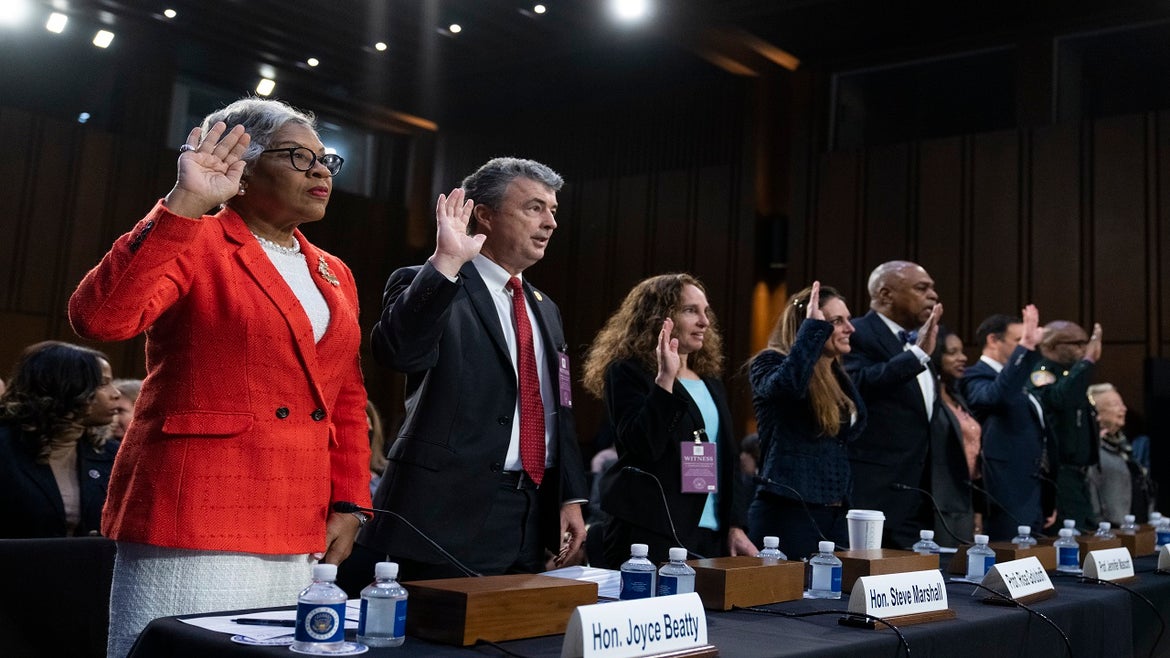Ketanji Brown Jackson answered oftentimes barbed questions for 22 hours before the Senate Judiciary Committee.
The fourth and final day of confirmation hearings for Judge Ketanji Brown Jackson came to a close Thursday, as witnesses testified about the legal and moral character of the first Black woman ever nominated to the nation's highest court.
After 22 hours of often contentious questioning by Republican senators, a panel of outside witnesses, including representatives of the American Bar Association, said President Joe Biden’s nominee could bring “impeccable” credentials to the Supreme Court.
After the proceedings ended, Senate Majority Leader Chuck Schumer of New York said, "There is not a shred of doubt in my mind she merits confirmation to the U.S. Supreme Court.”
Retired judge Ann Claire Williams of the American Bar Association testified about why her group unanimously awarded Jackson its highest rating. “The question we kept asking ourselves was, ‘How does one human being do so much so extraordinarily well?’” she told the senators Thursday.
“In the nearly 40 years that I’ve known Ketanji, I can’t remember ever hearing her say an unkind word to anybody, or even an unkind word about anybody," testified appellate attorney Richard Rosenthal, a lifelong friend.
The same could not be said for some GOP senators, who frequently interrupted Jackson and dismissed her answers during intense questioning on Tuesday and Wednesday. Some of the more heated queries came from Sen. Ted Cruz of Texas, who at one point asked Jackson if she thought "babies are racist."
The judge, who waited seven full seconds before answering, audibly sighted. "Senator," she said, "I do not believe that any child should be made to feel as though they are racist, or though they are not valued, or though that they are less than, that they are victims, that they are oppressors. I do not believe in any of that."
Jackson then added she was appearing before the committee to answer questions about her judicial and legal experience.
The pointed questions came from Cruz and other Republicans, including Sen. Lindsey Graham of South Carolina. Graham repeatedly talked over her explanations on an immigration policy ruling that had been later overturned and accused her of judicial "activism."
Democratic political leaders said the senators had badgered and disrespected the judge.
“To see what this highly qualified, remarkable woman had to face is a shame on those who try to declare themselves as senators,” Democratic Sen. Patrick Leahy of Vermont said after Wednesday’s hearing. “It’s beneath this body. It’s beneath the U.S. Supreme Court and it is beneath our great country.”
An emotional high point occurred Wednesday evening, when Democratic Sen. Cory Booker of New Jersey, gave an impassioned and unscripted endorsement of the judge and noted that, he too, as a Black man, knew the struggles of trying to break into mostly white institutions.
“It’s hard for me not to look at you and not see my mom," an overcome Booker told Jackson. "Not to see my cousins, one of them who had to come here and sit behind you. She had to have your back. I see my ancestors and yours,” Booker said. “But don’t worry, my sister. Don’t worry. God has got you. And how do I know that? You’re here, and I know what it’s taken for you to sit in that seat."
Jackson wiped away tears as Booker held her up as a role model to girls and women everywhere.
“You have earned this spot,” Booker said. “You are worthy. You are a great American.”
Despite the harsh questions from some senators, Booker said he refused to react with anger, saying he would allow no one "to steal my joy" at her historic nomination.
"Today, you’re my star. You are my harbinger of hope. This country’s getting better and better and better. And when that final vote happens, and you ascend on to the highest court in the land, I’m going to rejoice," Booker said.
The confirmation process is expected to be finished before Easter.
If approved, Jackson would be the first Supreme Court justice since Thurgood Marshall to have represented indigent defendants accused of committing criminal offenses.
She graduated magna cum laude from Harvard University, and graduated cum laude from Harvard Law School. She was an editor at the Harvard Law Review.
She has served as an assistant federal public defender, a commissioner on the U.S. Sentencing Commission, a private practice lawyer and as a judge on two federal courts.
Jackson was nominated by Biden to replace Supreme Court Justice Stephen Breyer, who announced his retirement at age 83 in January.
The tabloid media site TMZ stopped Breyer outside a Washington, D.C., restaurant, to ask about the condition of Justice Clarence Thomas, who was hospitalized last week with an infection and flu-like symptoms. The high court's media office has released no further information since then.
Thomas is "fine," Breyer said.






